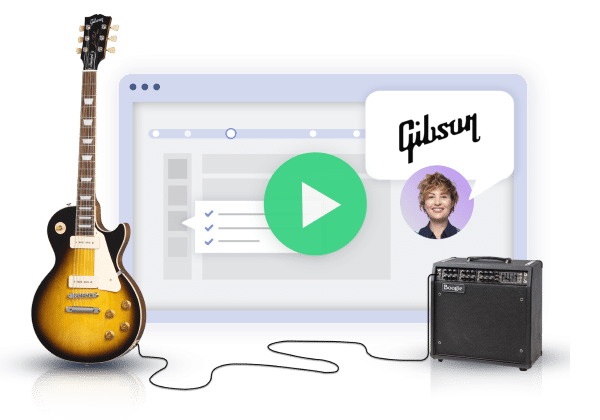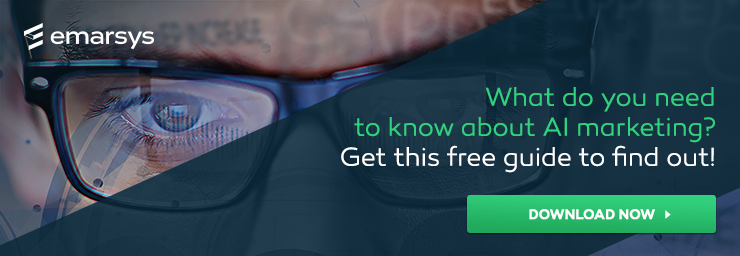The marketing landscape is changing, and artificial intelligence is on the forefront of this change. Customer expectations are growing and the demand for a one-to-one personalized experience has taken center stage. As these changes are happening, many marketers are turning to artificial intelligence to supplement and enhance their marketing strategies.
If you’re just getting started with AI marketing or looking to enhance the strategies you already have in place, this ultimate guide to AI marketing will help you dive further into the intricacies of using artificial intelligence in marketing.
This guide to AI marketing covers:
- What AI marketing is
- Why AI marketing is so important
- 5 examples of AI marketing
- How to successfully leverage AI in marketing
- The impact of AI marketing across industries
- How AI will impact marketing in 2018 and beyond
- Myths and misconceptions about AI marketing
What Is AI Marketing?
For many marketers, the problem with marketing today isn’t a lack of knowledge or skill to create personalized campaigns, but a shortage of time. With so many different opportunities to collect so much data from customers, there’s no way for a single person to take that data, uncover insights, and then set up automated marketing campaigns for each individual. Human-driven personalization just doesn’t scale.
Artificial intelligence marketing is the solution to that problem. AI marketing is a method of leveraging customer data and AI concepts like machine learning in marketing strategies to anticipate your customer’s next move and improve the customer journey through relevant content and individualized automation.
The goal of AI marketing is to free up marketing teams from doing data analysis so they can focus on strategy, content, and creative work.
For a more in-depth look at AI marketing, read What is AI Marketing?
Why Is AI Marketing So Important?
Though artificial intelligence may still seem relatively new, it’s been infiltrating the marketing world for some time. Companies like Google and Amazon have been harnessing the power of AI to create more targeted, personalized experiences for consumers for years and many companies are struggling to keep up.
Companies using artificial intelligence are changing their marketing — from promotion to personalization to performance. Customers now have search results, ads, even customer service tailored to their exact needs. Consumers no longer think of these personalized experiences as a nice bonus, rather they consider them a must-have. The brands that embrace this new experience and deliver it will win customers; those who don’t will lose customers and, in turn, revenue.
The demand for personalization has now exceeded the human’s capacity to scale it. But by using AI to bridge the gap between data and execution, the machine can analyze data and provide actionable insights so you can focus on providing the best experience for your customers.
Here are some of the top benefits of adopting AI as part of your marketing strategy:
Unified customer profiles
Implementing AI into your marketing strategy means you can finally see a complete picture of each of your contacts. As contacts and customers interact with your brand on social, through chat bots, and on your website, you are collecting a plethora of information about each of them. Using AI marketing, your platform can collect and unify data to give you a complete picture of each of your contacts.
True One-to-One Personalization
Using artificial intelligence marketing, you can now curate and execute messages that are targeted to each individual contact and customer. Send messaging, content, and even incentives that are directly targeted based on the individual contact’s behavior, making it a truly personalized experience.
Smart Segmentation
Artificial intelligence marketing allows you to target your segments beyond demographic data, like gender and age, and helps you get more granular with your groupings for marketing campaigns. Allowing the machine to analyze the data means you can segment as specifically as to one individual and also allows you to target based on behavior. For example, is a loyal customer defecting? AI marketing can not only help you predict which customers are at risk of defecting, but also help you win them back.
AI marketing should be an important facet of your strategy. Adopting AI will allow you to clear time-consuming data segmentation from your plate and make room for creating content and campaigns, conceptualizing new strategies, and crafting communications.
5 Examples of AI Marketing
1. Personalized Product Recommendations
Product recommendations are nothing new to retailers as many have deployed them on their websites and in emails, but usually they offered the same items to every person that visited or purchased a certain product. AI marketing allows you to display product recommendations that are personalized to each individual customer. Instead of seeing the same items as every other shopper, customers see items specifically picked out for them based on their past purchases and browser behavior.

2. Ad Optimization
From search engines to websites, digital ads have played a prevalent role in marketing strategies over the last 10 years. Now, with the implementation of AI, ads are becoming more targeted. AI marketing allows marketers to use customer data to serve up ads that are only pertinent to each user. If a user interacted with different clothing brands on Instagram, they might be served up an ad for a new clothing service based on browsing behavior.

3. Send Time Optimization
Optimizing send times is another example of AI marketing. Many marketers rely solely on A/B testing to determine the best time to send out all of their emails. The problem with this practice is that no two humans interact with their email exactly the same. Because of that, we need a way to deploy emails on an individual basis. Send Time Optimization uses AI to determine the best time to send an email for each individual customer and can deploy emails at the exact moment a customer is most likely to engage.

4. Individualized Incentives
When companies send mass incentives, they risk losing money on shoppers who would have paid full price without an incentive. Using AI to analyze customer behavior, you can identify which customers need an incentive to make a purchase and which ones will purchase without one. Sending these personalized incentives not only makes customers feel valued by the brand, but it also keeps brands from discounting too much of their inventory.

5. Virtual Assistants
When you think of voice-activated commerce, Amazon and Google are probably top of mind. While many brands are beginning to shift their focus to optimizing for voice search, these two giants are already capitalizing on the potential of voice AI. From commands to product searches, submitted in writing or by voice, they serve up content almost instantly based on your request – and are collecting a deluge of additional data on customers that can be used in the future as search queries are archived.
How to Successfully Leverage AI in Marketing
Once you understand the importance of using AI marketing in your strategy, it’s important to evaluate your current strategies and identify areas that can improve by implementing AI.
Optimize existing digital ads.
Ads that already exist are a great place to start. Once you’ve implemented AI and allowed the machine to learn from your existing customer data, you can begin to create smarter ads that speak to customers at their stage in the journey and get more targeted with personalized product recommendations, retargeting campaigns, and abandon browse ads.
Predict customer purchases.
AI can not only help you get a better picture of your customers, but it can also help you predict products they’ll actually purchase. By analyzing past behavior, including purchase and browse history, AI marketing can predict what products each customer is likely to purchase next — allowing you to serve up truly personalized product recommendations.
Stop using one-size-fits-all send times.
It’s time to stop thinking of Tuesday at 8 a.m. as “email time” or relying solely on A/B testing to grab your contacts’ attention. With AI marketing, the machine learns the best time for engagement for each individual contact. This means emails are delivered to contacts at the exact moment they are most likely to engage with your brand giving you the greatest chance for conversion.
Adopt individualized incentives instead of mass offerings.
Many brands send out mass incentives to large segments of their contact databases. The problem with this practice is it assumes every shopper needs an incentive to purchase when that’s simply not the case. Using AI, you can analyze purchase and engagement behavior from your customers to see what types of incentives drive them to purchase. Some customers may need a 20% off incentive before they convert, while others only need free shipping.
Related Article: The Promise of AI Marketing: 3 Ways Marketers are Using Artificial Intelligence
The Impact of AI Marketing Across Industries
As a consumer, you’ve probably already noticed how AI is impacting many different industries. Customers are giving more data than ever to brands under the condition that they receive a personalized experience. As customers adapt to a data-driven world filled with personalization and automation, companies must do the same.
Here are three industries that are already embracing AI marketing to win customers.
Travel
Understanding the need to stay connected with customers through improved experiences, many players in the travel industry have used AI marketing to transform their customer lifecycle. From the search experience to dynamic content that adapts throughout a trip, many travel brands – airlines especially – are using customer data to enhance the travel experience.
Frictionless booking: Companies like Google are utilizing AI to offer recommendations for travel dates based on availability and price right within a search. Customers can also book flights from brands directly in their browser, creating a frictionless booking experience.
Dynamic in-email boarding passes: Pulling from customer data, travel brands can include personal details – like boarding passes – in emails that customers can access for their flights and that update automatically when a gate number or flight time changes.
Retail
Targeted, highly personalized marketing from retail brands is something most of us have grown accustomed to. For many consumers, it’s become so normal that they’re put off by marketing communications that are not personalized. As retailers race to catch up to the likes of Amazon, many are deploying AI marketing tactics to stand out among customers.
Product recommendations: In the past, product recommendations consisted of popular products or items that complimented the product a shopper was viewing. Now, brands are utilizing machine learning to analyze customer data, including past purchases and browse behavior, to determine the right products to recommend. We now receive customized product recommendations right to our preferred device and have grown to expect it.
Chat bots: Customer service is a critical part of any business, but especially the retail business. From dealing with damaged items to poor in-store service, retailers rely on speedy solutions to keep customers happy. With the development of machine learning and AI, many companies are relying on chat bots to drive some of their customer service initiatives. These chat bots can have dialogues with customers, offer recommendations and solutions, and potentially solve problems without requiring the time of a customer service representative.
Media and Entertainment
It’s no surprise that media and entertainment show up on this list of industries already impacted by AI. Unless you’ve been living under a rock, you’ve most likely experienced some form of AI in your entertainment habits. The use of AI and machine learning have actually changed how we as humans consume certain types of content.
Smart recommendations: Services like Netflix and Hulu boast extensive algorithms designed to learn from watching behavior. From this data, these services recommend content most in line with viewing history. In the past, we may have relied on friends, family, or the internet to give us guidance on the next big show. Now, AI ensures that we’re presented with a show or movie based on our own behavior – making it harder for traditional outlets to capture our attention.
Social consumption: Because engagement is top priority for customer experience, many social media outlets have changed the way brands can get in front of consumers. These sites prioritize engagement and relationships over brands, creating social feeds filled with content based on past interactions. This has changed the way brands are able to market on these channels and the way we, as consumers, view content.
It’s important to take note of what is working for big brands and continuing to shift your strategy to fall in line.
How Will AI Impact Marketing in 2018?
AI shows no signs of slowing down in the marketing industry, and for good reason. With customers shifting their expectations of brands and how brands use their data, AI will play a massive role in helping you adapt and deploy data-driven campaigns in 2018 and beyond.
Personalization will no longer be optional.
Customers have made it abundantly clear that they want personalized experiences that show a brand really understands them. Seeing “Hi [First Name]” in an email will no longer cut it. Customers want one-to-one personalization in the form of individual incentives, product recommendation, and messaging. Marketers that use AI will be able to harness the mass amounts of customer data and provide these truly personalized experiences that drive higher conversions.
Voice AI will continue to gain steam.
From search to purchasing, voice technology is transforming the marketing industry. Marketing teams need to focus on including voice search and exploring the capabilities of AI marketing within this space. And with users of voice-assisted devices expected to reach 67 million by 2019, take hold of this trend quickly.
Data brokerage will make AI available on a larger scale.
As AI becomes more and more prevalent among marketers, we’ll see more brands wanting to take part. As a result, companies will emerge to broker data to teach algorithms to machines. This means a brand won’t need legacy data to get started with AI marketing; they’ll be able to pay a company to lend them data so their machines can learn and produce smarter algorithms.
Myths & Misconceptions About AI in Marketing
For years, we’ve been hearing about the future of artificial intelligence and its place among humans. Many of these predictions have been in the form of far-fetched sci-fi films, but some have infiltrated the very industry we work in.
As big brands have begun to adapt and capitalize on AI marketing, many marketers find themselves trying to dig further into what AI means for the future. In doing this, many myths and misconceptions about AI in marketing have surfaced, though most are unfounded.
AI is just another marketing buzzword.
For many, it’s easier to brush off AI as the latest fad happening in the marketing world. But unlike other marketing buzzwords that might come and go over the years, AI is just getting started in our industry. Brushing off AI as an intangible concept is a mistake that could cost you greatly as many companies turn to this solution to deploy human-like personalization at scale.
AI will take our jobs.
While the advent of AI in the workplace will definitely change the way we work, it will not replace all human jobs leaving us all with no work to do. Utilizing AI in marketing will allow us to delegate data-heavy tasks to the machine, so we can focus on planning more robust strategies that focus on creative and personalized content for true personalization.
AI will make computers better marketers than humans.
AI marketing can only be as successful as the human deploying it. While AI may take mundane tasks away from the marketer, it can’t truly deploy the strategy and creative that a human can. Machines can take in, segment, and analyze data to provide insights, but they are unable to fully understand humans. This means AI technology enables you to lean on the machine to optimize processes and operations so they you can focus attention on developing engaging strategies.
You need technical skills to work with AI.
Maybe the biggest misconception about AI in marketing is that you need to be a data scientist to successfully implement it into your strategy. But AI bridges the gap between the machine and the marketer. Machines will collect, analyze, and segment data so you can focus on the insights rather than spend time sifting through mass amounts of data.
My business doesn’t need AI to be successful.
While this might be true for some businesses, completely ignoring AI as you move into 2018 and beyond is a mistake. AI marketing allows brands to finally understand their customers and deploy the truly personalized experiences customers are now demanding. Big brands using AI are transforming the customer lifecycle — forcing other brands to follow suit or get lost in the mix.
Final Thoughts
As technology continues to evolve, more channels will emerge, and, in turn, more customer data. For marketing, this means figuring out a way to turn mass amounts of data into personalized campaigns that will drive engagement among customers. Without implementing AI into your strategy, this becomes a nearly impossible task. AI marketing allows you to bridge the gap between the work you’re doing and the data you’re collecting to implement seamless omnichannel strategies for your customers.
► Learn more about AI in marketing by downloading the eBook “Artificial Intelligence: The Bridge Between Data and Personalization” below.















